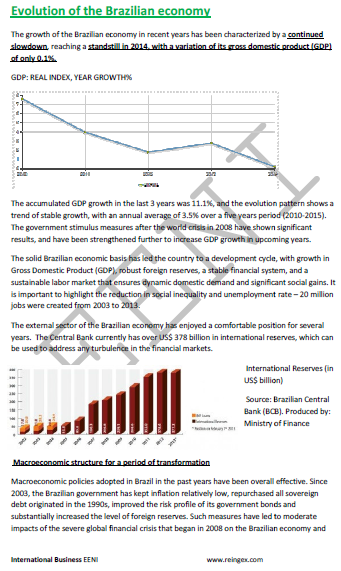Brazilian Economy. Oil Sector in Brazil

Economic Profile, Brazilian States. New middle class of Brazil
- Introduction to Brazil
- Brazilian Economy
- Industrial and services sector in Brazil
- New Brazilian middle-class
- Brazilian energy matrix
- Infrastructure in Brazil
- Economic Profile of the Brazilian States
- Petrol and Gas Sector in Brazil
- Brazilian Electronics Industry and Semiconductors
- Information Technology in Brazil
- Business Process Outsourcing in Brazil
- Life Sciences (Biotechnology, pharmaceuticals, and health care)
- Brazilian Economic and Financial Institutions
- Taxes in Brazil

The Subject “Brazilian Economy” belongs to the following Online Programs taught by EENI Global Business School:
Masters: International Business, Foreign Trade.
Doctorate: American Business, World Trade.

Languages:  or
or  Brasil
Brasil  Brasil
Brasil  Bresil.
Bresil.
- Credits of the Subject “Brazilian Economy”: 1

- Duration: one week

Brazil is the largest market in Latin America (accounts for 50% of the South American economy).
Brazilian Economy. Industrial and services sector in Brazil.
The Federative Republic of Brazil.
- Brazilian population: 200 million people, 50% of the American population
- Annual population growth: 2.5 million
- 70% of the Brazilian population lives in a strip of up to 100 kilometers from the coast
- Area: 8.5 million km² (47% of Latin American area)
- The largest country in Latin America (Iberian America)
- The fifth largest country in the World
- Brazil shares borders with Argentina, Bolivia, Colombia, French Guyana, Guyana, Paraguay, Peru, Suriname, Uruguay, and Venezuela
- Capital: Brasilia
- São Paulo is the city of business in Brazil
- Official language: Portuguese
- Currency: Brazilian Real
- Independence from Portugal in 1822
- Abolition of Slavery in Brazil: 1850
- African Diaspora in Brazil: 15.5 million people (28% of the Brazilian population)
Brazilian Economy.
- Brazil is one of the largest and significant emerging markets (BRICS Countries)
- Brazil stands in fifth place on the ranking of the largest economies in the World (since 2009, World Bank)
- Brazil represents 50% of the South American economy
- São Paulo accounts for 33% of the Brazilian GDP
- Brazil has the most diversified industrial sector in Latin America (Iberian America)
- Brazil is the world's eighth largest consumer market
- Brazil is the gateway to the MERCOSUR
- Brazil was the 20th largest importer representing 1.3% of world total imports; and the 25th largest exporter
- 74% of the export products are manufactures or semi-manufactures
- Brazil is the second-largest iron and concentrates exporter, one of the leading aluminum producers
- Brazil has advanced cars, aircraft, steel, textile and clothing, pharmaceutical and chemical products industries
- The largest world orange coffee, and sugar cane producer
- It is the third country of the global soft drinks production
- Brazilian textile industry is the responsible for 4.9% of the total GDP of the Brazilian industry
- Third largest shoe producer
- Brazil ranks 17th in the World Ranking of petroleum reserves and occupies the eleventh position among the largest producers in the World
Brazilian rankings. Brazil is...
- World's fifth largest market for mobile phones and PC
- One of the largest food producers in the World
- The largest beef and chicken exporter, and the fourth-largest pork exporter in the World
- World's second-largest soy products (beans, meal, and petrol) exporter
- World's largest sugar and orange juice exporter
- World's largest coffee and oranges manufacturer
- The largest sugar-cane manufacturer
- Has the world's largest commercial cattle herd
- World's second largest organic foods manufacturer
- World's third largest carbonated beverages manufacturer
- World's third largest fruit manufacturer
- Third largest genetically modified foods manufacturer
- Has huge areas available for agricultural growth
- Has the biggest forestry products industry in Latin America (Iberian America)
- The World leader in eucalyptus pulp production
- World's fifth-largest market, and the sixth largest motor vehicles manufacturer
- The Leading regional jet manufacturer in the World and the fourth largest commercial airliners manufacturer
- Has the fourth largest chartered oil tankers portfolio in the World
- One of the World's largest biofuel producers. Stands seventeenth in the World ranking of petroleum reserve, and the eleventh on the ranking of the largest petrol producers
- World's third largest consumer market for cosmetics
- One of the World's biggest raw and processed minerals producer and exporter
- An increasingly important consumer durables manufacturer
- Has a modern and competitive textile industry
- Receives 5 million of foreign tourists each year
- World's third largest footwear manufacturer, and has a greatly competitive leather industry
- Has the world's fifth-biggest rubber industry, and is the second largest market for retreaded tires
- Seventh biggest chemical industry in the World
- Eighth largest steel manufacturer
- Global largest exporter and the second largest ethanol manufacturer
- Global second largest iron manufacturer and third biggest of bauxite
- Has huge manganese, tin, and gold deposits
- Has the world's tenth biggest pulp and paper industry
- Has an extensive coastline with many ports
- Has one most modern telecommunications systems in the World
Brazilian Economy

Brazilian Regions.
Brazil has twenty-six States and one Federal District, placed in five regions.
- Central-West Region: Goiás, Mato Grosso and Mato Grosso do Sul, and the Federal district
- Northeast Region: Maranhão, Piauí, Ceará, Rio Grande do Norte, Paraíba, Pernambuco, Alagoas, Sergipe, and Bahía
- North Region: Acre, Amazonas, Roraima, Rondônia, Pará, Amapá, and Tocantins
- South-east region: Minas Gerais, Espírito Santo, Rio de Janeiro and São Paulo
- South Region: Parana, Santa Catarina, and Rio Grande do Sul
Brazilian States by GDP in R $ Thousands
São Paulo: 1.084.353.000
Rio de Janeiro: 353.878.000
Minas Gerais: 287.055.000
Rio Grande do Sul: 215.864.000
Paraná: 189.992.000
Bahia: 137.075.000
Federal district: 131.487.000
Santa Catarina: 129.806.000
Goiás: 85.615.000
Pernambuco: 78.428.000
Espírito Santo: 66.763.000
Ceará: 65.704.000
Pará: 58.402.000
Mato Grosso: 57.294.000
Amazonas: 49.614.000
Maranhão: 39.855.000
Mato Grosso do Sul: 36.368.000
Paraíba: 28.719.000
Rio Grande do Norte: 27.905.000
Alagoas: 21.235.000
Rondônia: 20.236.000
Sergipe: 19.767.000
Piauí: 19.033.000
Tocantins: 14.571.000
Amapá: 7.404.000
Acre: 7.386.000
Roraima: 5.593.000
Source: IBGE.
Distribution and sales representation are, in most cases, cost saving when compared to the incorporation of a local branch or affiliated company. However, these alternatives may bring a lack of control to the foreign investors over the way the third parties distribute or sell their products in Brazil and deal with their Trademarks.
International Paper Co.
International Paper was formed in 1898 and, with Union Camp (1999) and Champion International (2000); it is the largest company of paper and forest products in the World. The administration world is placed in the U.S., in Stamford, CT. The company has operations in fifty countries in the American continents, Europe, and Asia, and exports to 130 countries.
GERDAU
Gerdau Group occupies the position of the largest long steel manufacturer in the Americas, with steel plants distributed in Brazil, Argentina, Canada, Chile, the U.S., and Uruguay. Today, reaches a total installed capacity of 14.4 million tones of steel a year. Gerdau Group keeps a presence in the international market exporting high products and special common to all continents. For Gerdau Group, is an international, world-class, not just be present in a wide geography.
NATURA.
Natura Company was born in Brazil and bears the mark as proud and legitimate expression of their origin, but their engagement is greater with the human being, with the welfare and the individual and society, anywhere. So, go in search for new crops, bringing his vision of the World, exchange experiences, learn, create new roots and relations is part of its history.
Sources: Brazilian Government. Brazilian Institute of Geography and Statistics.
(c) EENI Global Business School (1995-2024)
We do not use cookies
Top of this page


